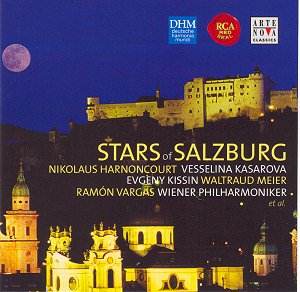From
the length of the title to this review, you may well have guessed
by now that this is, in effect, a souped-up sampler that retails
at lower mid-price. BMG Classics have quite a roster of artists
to call on, though, and the length of some of the excerpts makes
purchase worth considering. The tie-in with the Salzburg Festival
becomes clear if one logs on to www.salzburgfestival.com
(the Festival lasts from July 26th-August 31st).
Clearly (and unsurprisingly) there are some major names intending
to perform and here they are in a programme that may well delight,
if not stretch, the senses. There is nothing to ruffle one’s feathers
here, just a pleasant hour and a quarter’s worth.
The
programme starts well with a movement from Smetana’s Má
Vlast, and not the expected ‘Vltava’ at that. Instead, ‘From
Bohemia’s Fields and Groves’ is given both a loving and a lovely
performance by the Vienna Philharmonic under Harnoncourt. It even
becomes quite exultant, and forms an admirable contrast to the
Don Giovanni excerpt, from Bertrand de Billy’s complete
set on Arte Nova (review pending). Blustery speed and deft staccati
make for an exhilarating reading (the fast speed does not preclude
intelligibility, either). If everybody (or almost everybody) knows
this excerpt, an aria from the much lesser-known Zaide
forms a more than adequate companion. The soprano, Elena Moşuc
has a nice voice, if a bit tremulous.
A
harmless movement from a Devienne flute concerto (flute players
rejoice, but probably not anyone else) proves to be a bridge back
to the Romantic period, and James Galway plays it beguilingly.
If Johna Botha gives a thoroughly undistinguished ‘Nessun dorma’,
Vesselina Kasserova is positively radiant in the Gounod Roméo
excerpt (her later Bulgarian Traditional ‘encore’ shows her in
lighter mode, and in the company of a very enthusiastic choir).
Another highlight comes from the vocal chords of Ramón
Vargas, whose vigorous ‘Di quella pira’ has both drama and lyricism
as well as an intrinsically youthful timbre; separating them is
the ever-dextrous Evgeny Kissin in two Brahms Hungarian Dances.
His playing is, well, very Kissin. These pieces, luckily, suit
him well: he revels in the difficulties, and the notes cascade
from his fingers. Rhythmic niceties abound, and the D flat is
pure virtuoso fun.
Melanie
Diener, who appears in Don Giovanni at Salzburg, here gives
a radiant account of Strauss’ ‘September’, one of the Four
Last Songs. Her diction is superb. Only the closing horn solo
does not rise to the occasion (anyone who has heard the horn player
in the famous Schwarzkopf/Szell recording will not be satisfied
with less). Waltraud Meier (appearing in Salzburg in Offenbach!)
is on disc on home turf with Wagner. If her ‘Dich teure Halle’
does not have the opulence of Jessye Norman with the LPO under
Tennstedt on EMI (nor does she sound as regal), she nevertheless
carries real presence (her first entrance especially so). The
orchestra for Meier (one of the greats, the Bavarian Radio Symphony
Orchestra) is supremely well-drilled by Maestro Maazel.
The
rest of the disc after that is essentially a succession of encores.
Sarasate’s Introduction and Tarantella is in safe hands
played by Mirijam Contzen, although the recording is on the over-reverberant
side. A pity also that Diana Damrau is too weak of voice for Rachmaninov’s
‘Spring Waters’ – her pianist, Florian Henschel, steals the show
here. If I could easily live without the close-up recording of
La Jota, Nikolaj Znaider’s playing of Heifetz’ arrangement
of Ponce’s Estrellita provides a fetching close to the
disc.
Careful
programming saves this disc from becoming too much of a patchwork
quilt, and there is much to enjoy. All the same, I wonder how
often it is going to come down off the shelf.
Colin
Clarke



